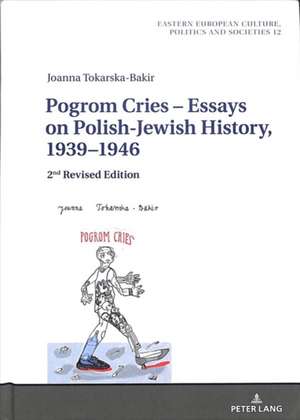Pogrom Cries - Essays on Polish-Jewish History, 1939-1946: Eastern European Culture, Politics and Societies
Autor Joanna Tokarska-Bakiren Limba Engleză Hardback – 2 iul 2019
Din seria Eastern European Culture, Politics and Societies
- 23%
 Preț: 477.71 lei
Preț: 477.71 lei - 23%
 Preț: 495.06 lei
Preț: 495.06 lei - 23%
 Preț: 450.80 lei
Preț: 450.80 lei -
 Preț: 496.98 lei
Preț: 496.98 lei - 23%
 Preț: 466.55 lei
Preț: 466.55 lei -
 Preț: 552.56 lei
Preț: 552.56 lei -
 Preț: 404.71 lei
Preț: 404.71 lei - 23%
 Preț: 606.19 lei
Preț: 606.19 lei - 23%
 Preț: 438.10 lei
Preț: 438.10 lei -
 Preț: 536.84 lei
Preț: 536.84 lei -
 Preț: 383.03 lei
Preț: 383.03 lei -
 Preț: 536.67 lei
Preț: 536.67 lei -
 Preț: 455.72 lei
Preț: 455.72 lei - 27%
 Preț: 983.80 lei
Preț: 983.80 lei - 19%
 Preț: 624.35 lei
Preț: 624.35 lei -
 Preț: 516.95 lei
Preț: 516.95 lei
Preț: 463.25 lei
Preț vechi: 601.62 lei
-23% Nou
Puncte Express: 695
Preț estimativ în valută:
88.65€ • 92.21$ • 73.19£
88.65€ • 92.21$ • 73.19£
Carte tipărită la comandă
Livrare economică 14-28 aprilie
Preluare comenzi: 021 569.72.76
Specificații
ISBN-13: 9783631774489
ISBN-10: 3631774486
Pagini: 512
Dimensiuni: 156 x 218 x 35 mm
Greutate: 0.82 kg
Ediția:2. Auflage
Editura: Peter Lang Copyright AG
Seria Eastern European Culture, Politics and Societies
ISBN-10: 3631774486
Pagini: 512
Dimensiuni: 156 x 218 x 35 mm
Greutate: 0.82 kg
Ediția:2. Auflage
Editura: Peter Lang Copyright AG
Seria Eastern European Culture, Politics and Societies
Notă biografică
Joanna Tokarska-Bakir is a cultural anthropologist and Professor at the Institute of Slavic Studies of the Polish Academy of Sciences at Warsaw, Poland. She specialises in the anthropology of violence and is the author, among others, of a monograph on blood libel in European perspective and a monograph on the Kielce pogrom.
Cuprins
The Unrighteous Righteous and the Righteous Unrighteous - An AL Unit and its Attitude Towards Jews. The Trial of Tadeusz Maj - Our Class in Klimontów Sandomierski - Ethnographic Findings on the Aftermath of the Holocaust Through Jewish and Polish Eyes - The Figure of Bloodsucker - Cries of the Mob in the Pogroms in Rzeszów, Cracow and Kielce - Communitas of Violence - Barabasz and Jews - Suppressio veri, suggestio falsi. The History of Ryszard Maj's Testimony
Descriere
This book reexamines the situation of Jews who after the liquidation of ghettos were hiding in the villages of the Kielce-Sandomierz region, and the attitude of local Christian people and partisans towards these Jews. A fresh perspective is contributed by the author's anthropological approach to the newly discovered field and archival sources.
